代词[上学期]
图片预览
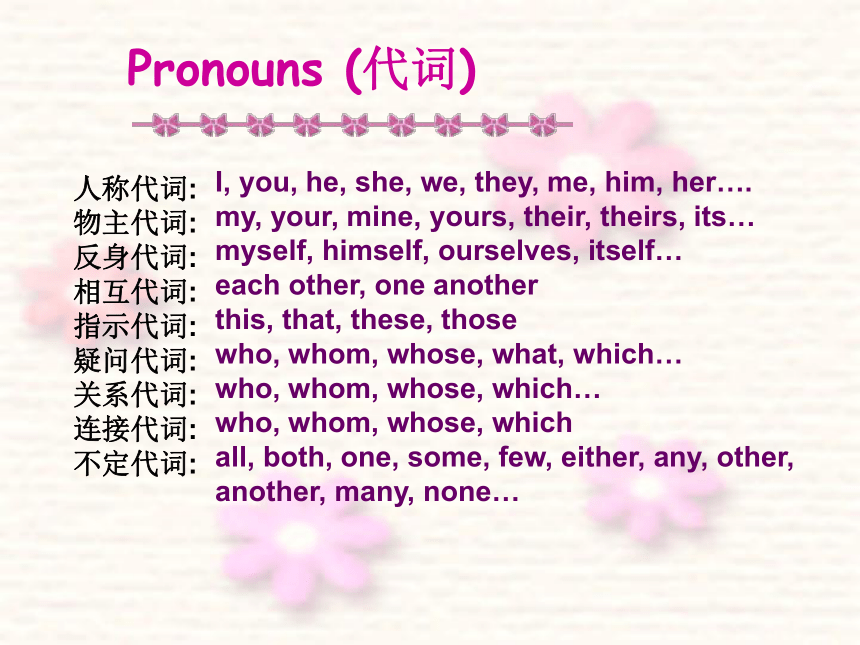
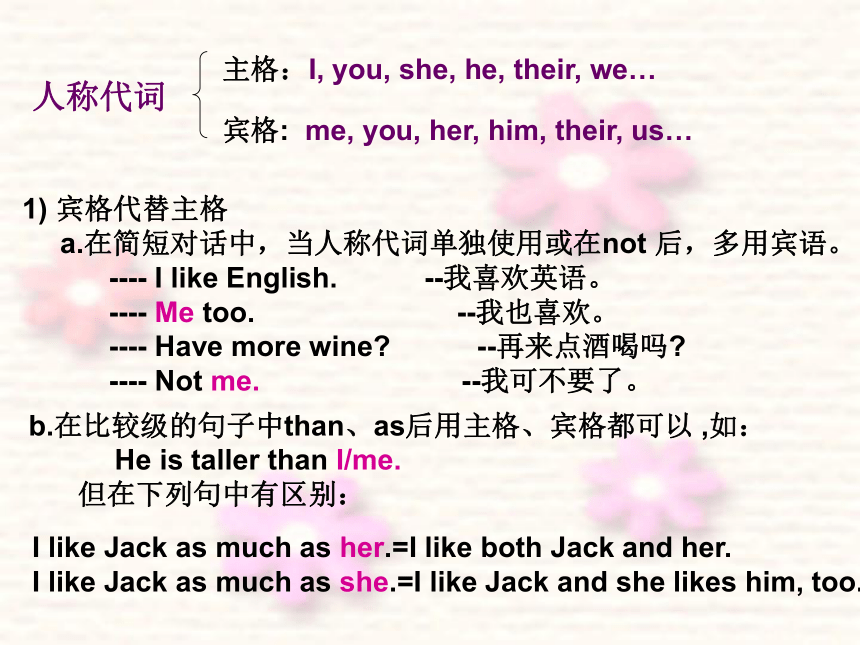
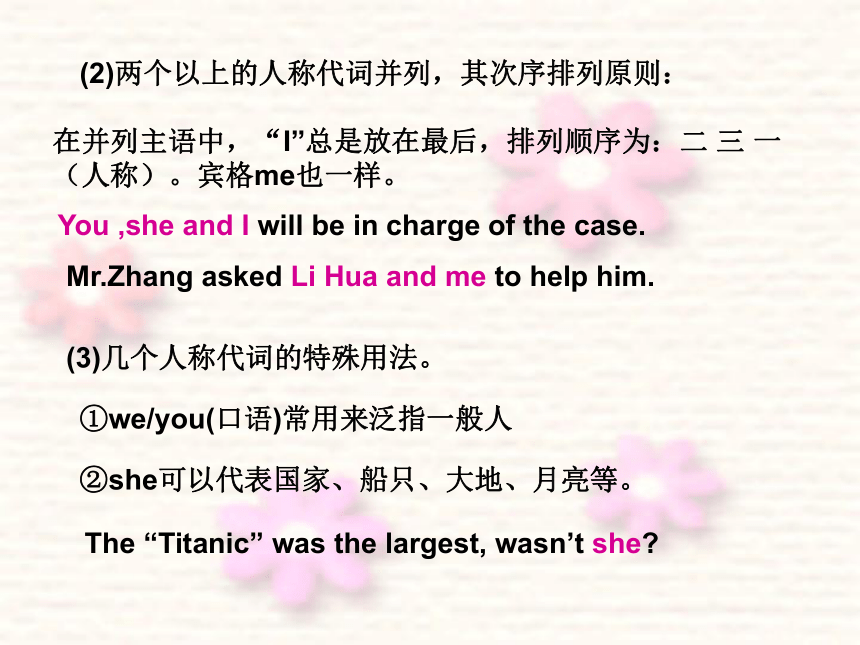
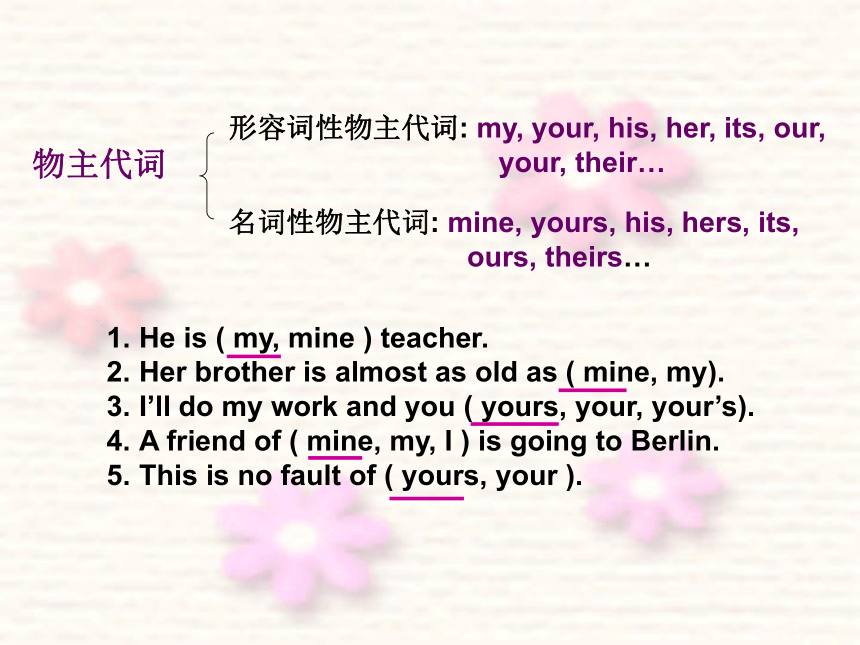
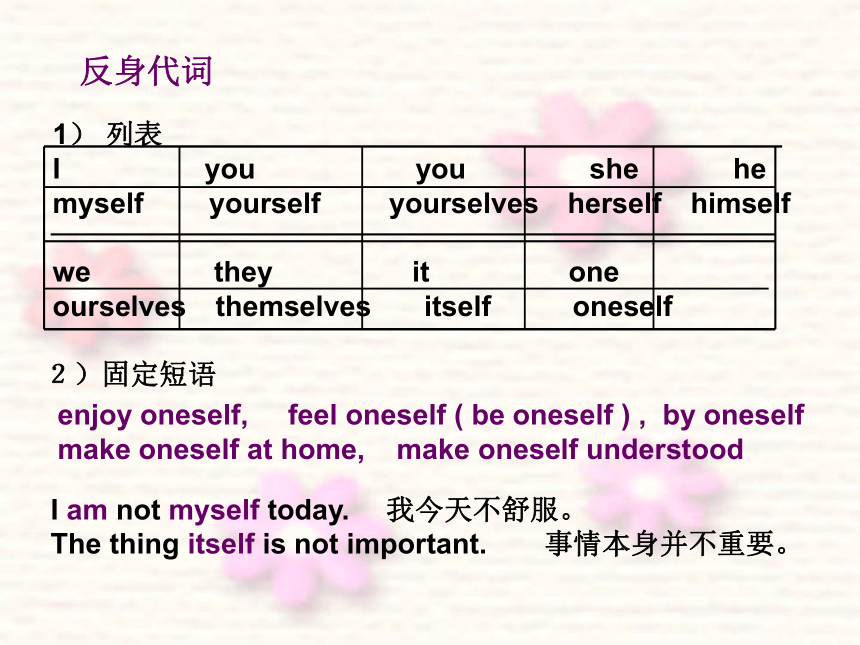
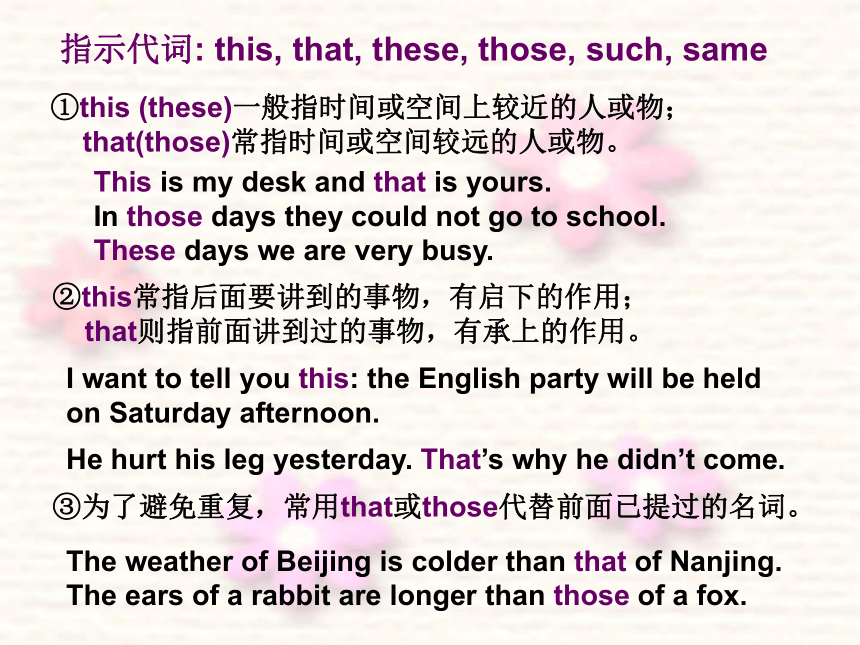
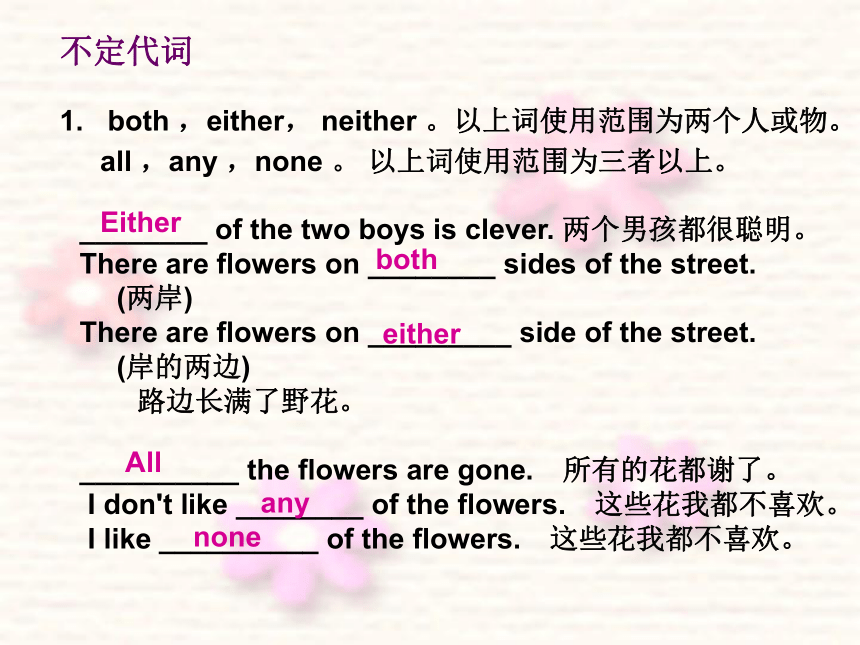
文档简介
课件14张PPT。Pronouns (代词)人称代词:
物主代词:
反身代词:
相互代词:
指示代词:
疑问代词:
关系代词:
连接代词:
不定代词:I, you, he, she, we, they, me, him, her….
my, your, mine, yours, their, theirs, its…
myself, himself, ourselves, itself…
each other, one another
this, that, these, those
who, whom, whose, what, which…
who, whom, whose, which…
who, whom, whose, which
all, both, one, some, few, either, any, other, another, many, none… 人称代词主格:I, you, she, he, their, we…宾格: me, you, her, him, their, us…1) 宾格代替主格 a.在简短对话中,当人称代词单独使用或在not 后,多用宾语。 ---- I like English. --我喜欢英语。 ---- Me too. --我也喜欢。 ---- Have more wine? --再来点酒喝吗? ---- Not me. --我可不要了。 b.在比较级的句子中than、as后用主格、宾格都可以 ,如: He is taller than I/me. 但在下列句中有区别: I like Jack as much as her.=I like both Jack and her.
I like Jack as much as she.=I like Jack and she likes him, too.(2)两个以上的人称代词并列,其次序排列原则:在并列主语中,“I”总是放在最后,排列顺序为:二 三 一(人称)。宾格me也一样。 You ,she and I will be in charge of the case.Mr.Zhang asked Li Hua and me to help him.(3)几个人称代词的特殊用法。①we/you(口语)常用来泛指一般人 ②she可以代表国家、船只、大地、月亮等。The “Titanic” was the largest, wasn’t she?物主代词形容词性物主代词: my, your, his, her, its, our,
your, their…名词性物主代词: mine, yours, his, hers, its,
ours, theirs…He is ( my, mine ) teacher.
Her brother is almost as old as ( mine, my).
I’ll do my work and you ( yours, your, your’s).
A friend of ( mine, my, I ) is going to Berlin.
This is no fault of ( yours, your ).
反身代词1) 列表 I you you she he myself yourself yourselves herself himself we they it one ourselves themselves itself oneself 2)固定短语 enjoy oneself, feel oneself ( be oneself ) , by oneself
make oneself at home, make oneself understoodI am not myself today. 我今天不舒服。 The thing itself is not important. 事情本身并不重要。指示代词: this, that, these, those, such, same①this (these)一般指时间或空间上较近的人或物;
that(those)常指时间或空间较远的人或物。This is my desk and that is yours.
In those days they could not go to school.
These days we are very busy.②this常指后面要讲到的事物,有启下的作用;
that则指前面讲到过的事物,有承上的作用。I want to tell you this: the English party will be held on Saturday afternoon.He hurt his leg yesterday. That’s why he didn’t come.③为了避免重复,常用that或those代替前面已提过的名词。The weather of Beijing is colder than that of Nanjing.
The ears of a rabbit are longer than those of a fox.不定代词 both ,either, neither 。以上词使用范围为两个人或物。 all ,any ,none 。 以上词使用范围为三者以上。 ________ of the two boys is clever. 两个男孩都很聪明。 There are flowers on ________ sides of the street. (两岸) There are flowers on _________ side of the street. (岸的两边) 路边长满了野花。
__________ the flowers are gone. 所有的花都谢了。 I don't like ________ of the flowers. 这些花我都不喜欢。 I like __________ of the flowers. 这些花我都不喜欢。 EitherbotheitherAllanynone2. some & any一般用法:some一般用于肯定句,
any多用于疑问、否定或条件句。He has some Chinese paintings. I don’t know any of the students. 特殊用法:①any用于肯定句表示“任何”的意思。
Any child can do that.(定语)
You may take any of them.(宾语)②some用于单数可数名词前表示“某一”。
Smith went to some place in England.(定语)③在期待对方回答yes 时,some用在表示请求或邀请的问句中。
Would you like some bananas?(邀请)
Mum, could you give me some money?(请求)3. each & everyeach(各个),指两个或两个以上的人或物,侧重个体,在句中作主语、宾语、定语和同位语。
every(每个),指三个或三个以上的人或物,侧重整体,在句中只能作定语。Every student in our class has a dictionary.(定语,强调班上“所有的人”)
Each student in our class has a dictionary.(定语,强调各个个体)
Each of them has been there.(主语)
The teacher gave each of the students a new textbook.(宾语)
We each got a ticket.(同位语)4. one, that, it, those, the one, the ones”指代” 1) I can't find my hat. I think I must buy ________.
2) The hat you bought is bigger than __________I bought.
3) I can‘t find my hat. I don’ t know where I put ______.
4) The popular in Chinese is much larger than ______ in Japan.
5) The ears of a rabbit are longer than __________ of a fox.
onethe oneitthatthose5. one/another/the other /others/ other one… the other 只有两个 some… the others 有三个以上 one… another,another… some… others,others… others = other people/things the others = the rest 剩余的全部1) 泛指另一个用another。 2) 一定范围内两人(物),一个用one,另一个用the other。 3) 一定范围内三者,一个用one,另一个用one (another),第三个可用the other,a third。 4) 一定范围内,除去一部分人/物,剩余的全部用the others。 5) 泛指别的人或物时,用others当在一定范围内,除去一部分后,剩余部分但不是全部时,也用others。 I don’t like this one, can you show me __________?
You should think of __________.
I’m busy now, ask me about it some __________ time.
Some like basketball, __________ prefer football.
I want to drink __________ glass of milk
Five students in our class are boys, ______________ are girls.
She has two bags, one is white, ____________ is black.
There are ________ ways of solving this problem.
one/another/the other /others/ otheranotherothersotherothersanotherthe othersthe otherother6. all, both, every 与not连用,表示部分否定.All birds could not fly.
=Not all birds could fly
No bird could fly.
= None of the birds could fly.
Both of us are not teachers.7.anyone/any one; anyone仅指人,any one既可指人,也可指物。 a) none 后跟of短语,既可指人又可指物,而no one只单独使用,只指人。 b) none 作主语,谓语动词用单,复数均可,而no one作主语谓语动词只能是单数。 None of you could lift it. 你们中没有人可举起它。 ---- Did any one call me up just now? --刚才有人打电话给我吗? ---- No one. --没有。8.no one 和none
物主代词:
反身代词:
相互代词:
指示代词:
疑问代词:
关系代词:
连接代词:
不定代词:I, you, he, she, we, they, me, him, her….
my, your, mine, yours, their, theirs, its…
myself, himself, ourselves, itself…
each other, one another
this, that, these, those
who, whom, whose, what, which…
who, whom, whose, which…
who, whom, whose, which
all, both, one, some, few, either, any, other, another, many, none… 人称代词主格:I, you, she, he, their, we…宾格: me, you, her, him, their, us…1) 宾格代替主格 a.在简短对话中,当人称代词单独使用或在not 后,多用宾语。 ---- I like English. --我喜欢英语。 ---- Me too. --我也喜欢。 ---- Have more wine? --再来点酒喝吗? ---- Not me. --我可不要了。 b.在比较级的句子中than、as后用主格、宾格都可以 ,如: He is taller than I/me. 但在下列句中有区别: I like Jack as much as her.=I like both Jack and her.
I like Jack as much as she.=I like Jack and she likes him, too.(2)两个以上的人称代词并列,其次序排列原则:在并列主语中,“I”总是放在最后,排列顺序为:二 三 一(人称)。宾格me也一样。 You ,she and I will be in charge of the case.Mr.Zhang asked Li Hua and me to help him.(3)几个人称代词的特殊用法。①we/you(口语)常用来泛指一般人 ②she可以代表国家、船只、大地、月亮等。The “Titanic” was the largest, wasn’t she?物主代词形容词性物主代词: my, your, his, her, its, our,
your, their…名词性物主代词: mine, yours, his, hers, its,
ours, theirs…He is ( my, mine ) teacher.
Her brother is almost as old as ( mine, my).
I’ll do my work and you ( yours, your, your’s).
A friend of ( mine, my, I ) is going to Berlin.
This is no fault of ( yours, your ).
反身代词1) 列表 I you you she he myself yourself yourselves herself himself we they it one ourselves themselves itself oneself 2)固定短语 enjoy oneself, feel oneself ( be oneself ) , by oneself
make oneself at home, make oneself understoodI am not myself today. 我今天不舒服。 The thing itself is not important. 事情本身并不重要。指示代词: this, that, these, those, such, same①this (these)一般指时间或空间上较近的人或物;
that(those)常指时间或空间较远的人或物。This is my desk and that is yours.
In those days they could not go to school.
These days we are very busy.②this常指后面要讲到的事物,有启下的作用;
that则指前面讲到过的事物,有承上的作用。I want to tell you this: the English party will be held on Saturday afternoon.He hurt his leg yesterday. That’s why he didn’t come.③为了避免重复,常用that或those代替前面已提过的名词。The weather of Beijing is colder than that of Nanjing.
The ears of a rabbit are longer than those of a fox.不定代词 both ,either, neither 。以上词使用范围为两个人或物。 all ,any ,none 。 以上词使用范围为三者以上。 ________ of the two boys is clever. 两个男孩都很聪明。 There are flowers on ________ sides of the street. (两岸) There are flowers on _________ side of the street. (岸的两边) 路边长满了野花。
__________ the flowers are gone. 所有的花都谢了。 I don't like ________ of the flowers. 这些花我都不喜欢。 I like __________ of the flowers. 这些花我都不喜欢。 EitherbotheitherAllanynone2. some & any一般用法:some一般用于肯定句,
any多用于疑问、否定或条件句。He has some Chinese paintings. I don’t know any of the students. 特殊用法:①any用于肯定句表示“任何”的意思。
Any child can do that.(定语)
You may take any of them.(宾语)②some用于单数可数名词前表示“某一”。
Smith went to some place in England.(定语)③在期待对方回答yes 时,some用在表示请求或邀请的问句中。
Would you like some bananas?(邀请)
Mum, could you give me some money?(请求)3. each & everyeach(各个),指两个或两个以上的人或物,侧重个体,在句中作主语、宾语、定语和同位语。
every(每个),指三个或三个以上的人或物,侧重整体,在句中只能作定语。Every student in our class has a dictionary.(定语,强调班上“所有的人”)
Each student in our class has a dictionary.(定语,强调各个个体)
Each of them has been there.(主语)
The teacher gave each of the students a new textbook.(宾语)
We each got a ticket.(同位语)4. one, that, it, those, the one, the ones”指代” 1) I can't find my hat. I think I must buy ________.
2) The hat you bought is bigger than __________I bought.
3) I can‘t find my hat. I don’ t know where I put ______.
4) The popular in Chinese is much larger than ______ in Japan.
5) The ears of a rabbit are longer than __________ of a fox.
onethe oneitthatthose5. one/another/the other /others/ other one… the other 只有两个 some… the others 有三个以上 one… another,another… some… others,others… others = other people/things the others = the rest 剩余的全部1) 泛指另一个用another。 2) 一定范围内两人(物),一个用one,另一个用the other。 3) 一定范围内三者,一个用one,另一个用one (another),第三个可用the other,a third。 4) 一定范围内,除去一部分人/物,剩余的全部用the others。 5) 泛指别的人或物时,用others当在一定范围内,除去一部分后,剩余部分但不是全部时,也用others。 I don’t like this one, can you show me __________?
You should think of __________.
I’m busy now, ask me about it some __________ time.
Some like basketball, __________ prefer football.
I want to drink __________ glass of milk
Five students in our class are boys, ______________ are girls.
She has two bags, one is white, ____________ is black.
There are ________ ways of solving this problem.
one/another/the other /others/ otheranotherothersotherothersanotherthe othersthe otherother6. all, both, every 与not连用,表示部分否定.All birds could not fly.
=Not all birds could fly
No bird could fly.
= None of the birds could fly.
Both of us are not teachers.7.anyone/any one; anyone仅指人,any one既可指人,也可指物。 a) none 后跟of短语,既可指人又可指物,而no one只单独使用,只指人。 b) none 作主语,谓语动词用单,复数均可,而no one作主语谓语动词只能是单数。 None of you could lift it. 你们中没有人可举起它。 ---- Did any one call me up just now? --刚才有人打电话给我吗? ---- No one. --没有。8.no one 和none
